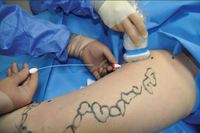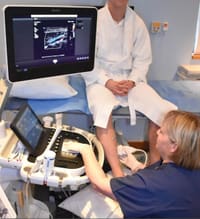 The first question that I asked myself when setting up this meeting was, “Does the world really need another vein meeting?” Having regularly attended national and international vein meetings for 20 years, I felt that the answer was “yes” – but only if it offered something new.
The first question that I asked myself when setting up this meeting was, “Does the world really need another vein meeting?” Having regularly attended national and international vein meetings for 20 years, I felt that the answer was “yes” – but only if it offered something new.
The Concept behind the Meetings
Learn – Understand – Watch – Ask. Generally, vein meetings tend to fall into certain patterns. The more academic meetings have a series of talks on a variety of subjects, often a mixture of clinical studies and basic science, either by invited experts or selected by abstract. The more didactic meetings tend to have expert speakers teaching about their own subjects. However few, if any, meetings focus on one subject at a time and take it from the basic understanding (through the latest advances) and show how this works in practice and then allows delegates to ask questions.
Hence The College of Phlebology’s 1st International Vein Meeting
Spread over three days, each day the main stream will concentrate on one subject at a time, including thermal ablation, non-thermal ablation, pelvic vein embolization, perforator vein disease and venous leg ulcers.
Each subject will be followed through in order, allowing all delegates to find their own level of understanding of the subject and then add to their knowledge:
- Learn – Each subject or technique will start off with presentations on the basics – why do it? Who is suitable? What devices are used? How did this subject or technique develop? This will help delegates with little or no experience in the area come to grips with the subject or technique.
- Understand – The subject or technique will then be analyzed deeper. It will explore the latest studies, devices and relevant basic science presented to deepen the understanding and to help delegates understand how to improve their practice. This will be suitable for those already experienced in these techniques, as well as bringing the less experienced on from the learning section.
- Watch – There will then be live links to ultrasound suites, operating theatres and radiology rooms where live cases will be performed by recognized experts in the field. Depending on the subject or technique being explored, the live cases may be both diagnostic and treatment. Delegates will be able to ask the specialists questions during the procedures, mediated through the session chairman. In this way, delegates will not only see the latest procedures, but will be able to clear up any specific points of interest or technique immediately.
- Ask – Finally, each subject or technique will be opened up for questions from any of the delegates and there will be an interactive voting system and text messaging system to make sure that delegates have a chance to express their views or ask questions, even if they do not want to stand up at a microphone.
“Many meetings invite members on to the faculty because they are “well-known industry names,” or because they are “regulars.” This means that delegates going to more than one meeting will often hear the same people giving the same talks.”
Each of the “learn / understand / watch / ask” sessions will last for three to four hours, enabling two subjects each day to be explored in great depth and detail.
Of course, not all delegates will be interested in all of the sessions, and so there are two parallel lecture theatres also going on throughout the conference offering alternative learning and discussion experiences.
 Parallel Lecture Theatres
Parallel Lecture Theatres
Parallel 1 Veins: Basic science / lectures / hands on workshops The first of the parallel lecture theatres will have a variety of sessions of interest. These will include basic science related to phlebology, lectures on more esoteric areas of phlebology that are not covered in the “learn / understand /watch / ask” sessions. In addition, there will be hands-on workshops where delegates can get their hands on equipment that they might not be used to, and will be shown how to get the best out of each device.
Parallel 2 Leg Ulcers: Run by The Leg Ulcer Charity and supported by The Lindsay Club Leg ulcers are predominantly venous in nature. Traditionally treated by dressing and compression, research has shown many – if not most— can be cured by intervention. Ambulatory endovenous techniques can cure some 50-85% of venous ulcers and stenting obstructive disease can increase this further. Over three days, this satellite theatre will explore the assessment and whole range of treatments that are now becoming available for this chronic and debilitating disease.
“The College of Phlebology has always been a society that offers mutual advice and support to anyone involved in phlebology. Until this meeting, this has only been possible through our online forum.”
Faculty
Many meetings invite members on to the faculty because they are “well-known industry names,” or because they are “regulars.” This means that delegates going to more than one meeting will often hear the same people giving the same talks.
In keeping with the “learn / understand / watch / ask” approach, we have invited faculty who are practical experts in their field who have huge personal experience in the procedures they are talking about. In this way, the faculty is able to guide the delegates into understanding the new concepts in each subject or technique discussed, and is able to give tips from wide experience rather than figures that have been published outside of this meeting.

Who Should Benefit Most From Attending?
The College of Phlebology has always been a society that offers mutual advice and support to anyone involved in phlebology. Until this meeting, this has only been possible through our online forum.
This first international meeting is aimed at helping build the community that we have been developing online, allowing members to meet, learn and exchange ideas and experience. We believe that anyone dealing with patients with varicose veins, pelvic congestion or other venous disease, or looking after patients with leg ulcers, will benefit greatly from this meeting.
To Be Launched at the Meeting
In addition to the sessions outlined above, we are due to launch several new things at the conference that are currently being finalized. The agreements are also being finalized – but in the weeks leading up to the conference, several new topical items related to phlebology will be unveiled at the meeting.
To register for the conference, please click here.


